- CN
May 23, 2025

Every year on May 25, Africa Day celebrates the unity, progress, and resilience of the African continent. It is a day to reflect not only on Africa’s achievements but also on the power of solidarity in overcoming challenges. Few moments in recent history have tested this spirit more than the 2014 Ebola outbreak in Sierra Leone.
The crisis arrived like a storm. Nearly 30,000 people in Sierra Leone were infected, and over 11,000 lost their lives as communities faced unimaginable loss. The Ebola virus, transmitted through bodily fluids and close contact, posed significant challenges to daily life in villages and cities. Families faced uncertainty, and even traditional practices, such as funerals, had to be reconsidered to prevent further transmission.
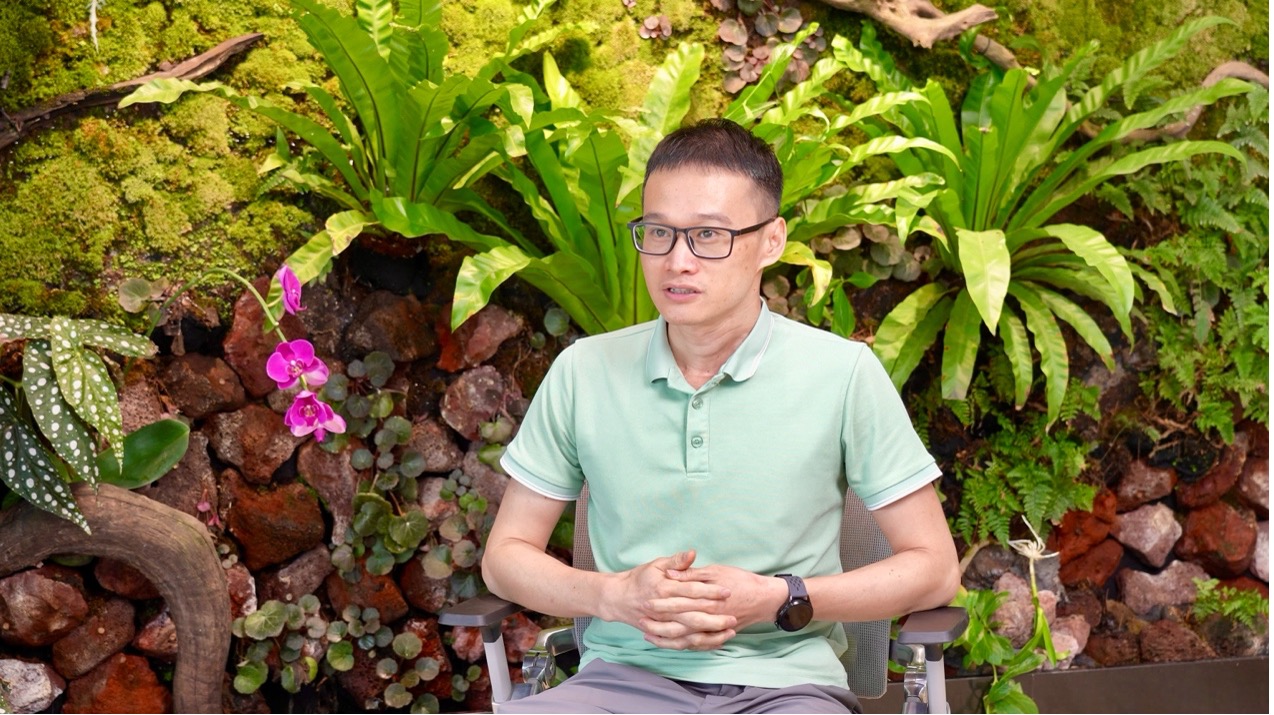 Chen Chengchao, Member of BGI’s Advance Team for the Ebola Response in Sierra Leone in 2015.
Chen Chengchao, Member of BGI’s Advance Team for the Ebola Response in Sierra Leone in 2015.
In the midst of this turmoil, global cooperation became a lifeline and BGI was among those who stepped forward. For Chen Chengchao, a member of BGI’s advance team for the Ebola response, the call to support Sierra Leone in 2015 was met with both determination and humility. “As part of BGI, we also felt it was our duty and responsibility to contribute to humanity,” Chen says.
“After receiving the news, our supervisor briefed us on the situation, and everyone volunteered to sign up. Three of us in the team wanted to sign up, but the registration was full in just about a day.” Eventually, Chen Chengchao and other three BGI volunteers, Wang Rui, Zhu Zhangyong, and Lan Zhiheng, were selected.
For Chen, this was more than a professional assignment - it was a mission rooted in solidarity and the hope of making a difference - but the journey to Sierra Leone was not without fear. “At the time, it was hard to explain to my parents, and I was afraid they’d worry. So, I only said that I was going to Africa for a business trip and would return in a month, without giving them more specific details,” Chen remembers.
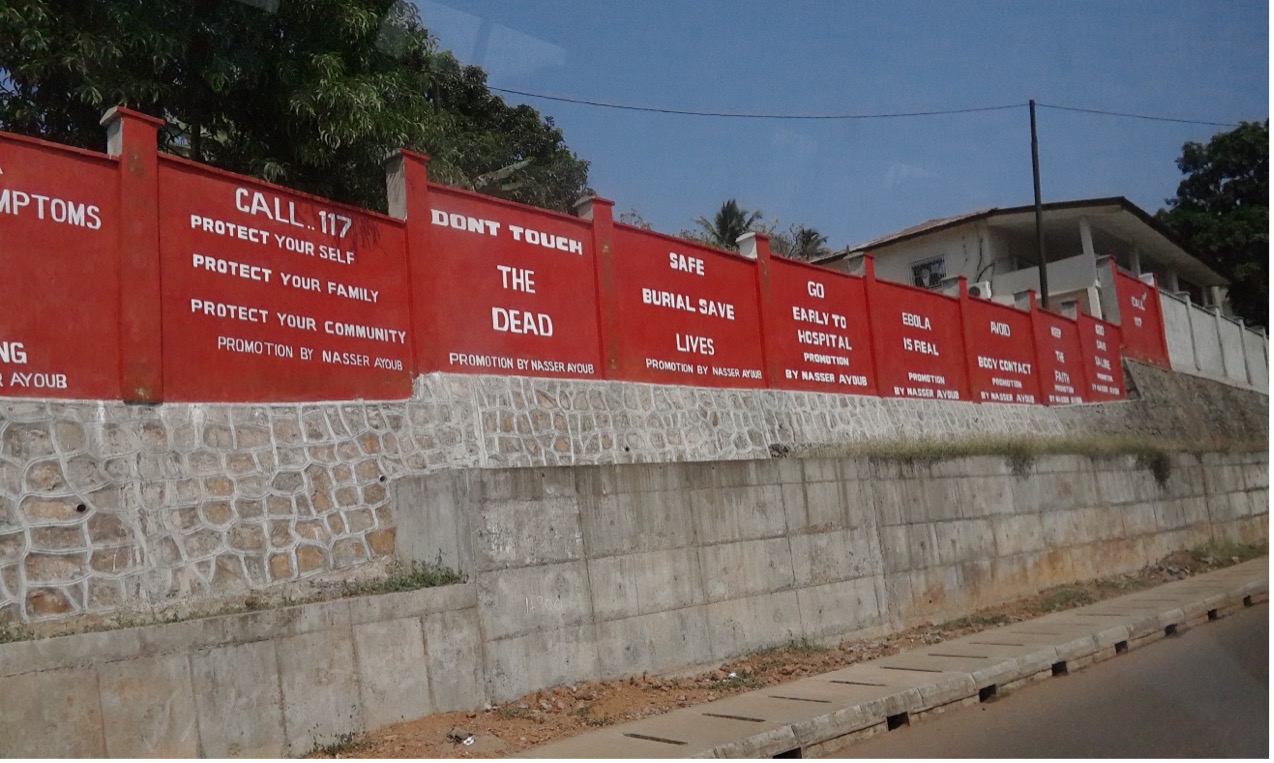 Ebola warning slogans on the streets of Freetown, Sierra Leone, 2015.
Ebola warning slogans on the streets of Freetown, Sierra Leone, 2015.
The dangers became real even before they arrived. Transferring through Belgium, Chen and his colleagues boarded a flight bound for Freetown. Midway through the journey, a fellow passenger began suffering symptoms that could signal Ebola. “During the trip, someone on the flight had a nosebleed and a fever. One of our team members, who hadn’t fallen asleep, was approached by the flight attendant to check on the situation of this person and another passenger. Because of this incident, it was suspected that the person might have been infected with Ebola. The plane made an emergency landing, and the patient was taken to the hospital for examination.”
The incident was a sobering reminder of the risks ahead. Upon arriving in Sierra Leone, the team faced a mandatory seven-day quarantine in separate hotel rooms. “At first, we were quite worried about whether we might get infected with Ebola, concerned that we might be infected even before starting any work,” Chen says, “but when the results came back negative for Ebola, we all breathed a sigh of relief. Only then could we start working normally with others.”
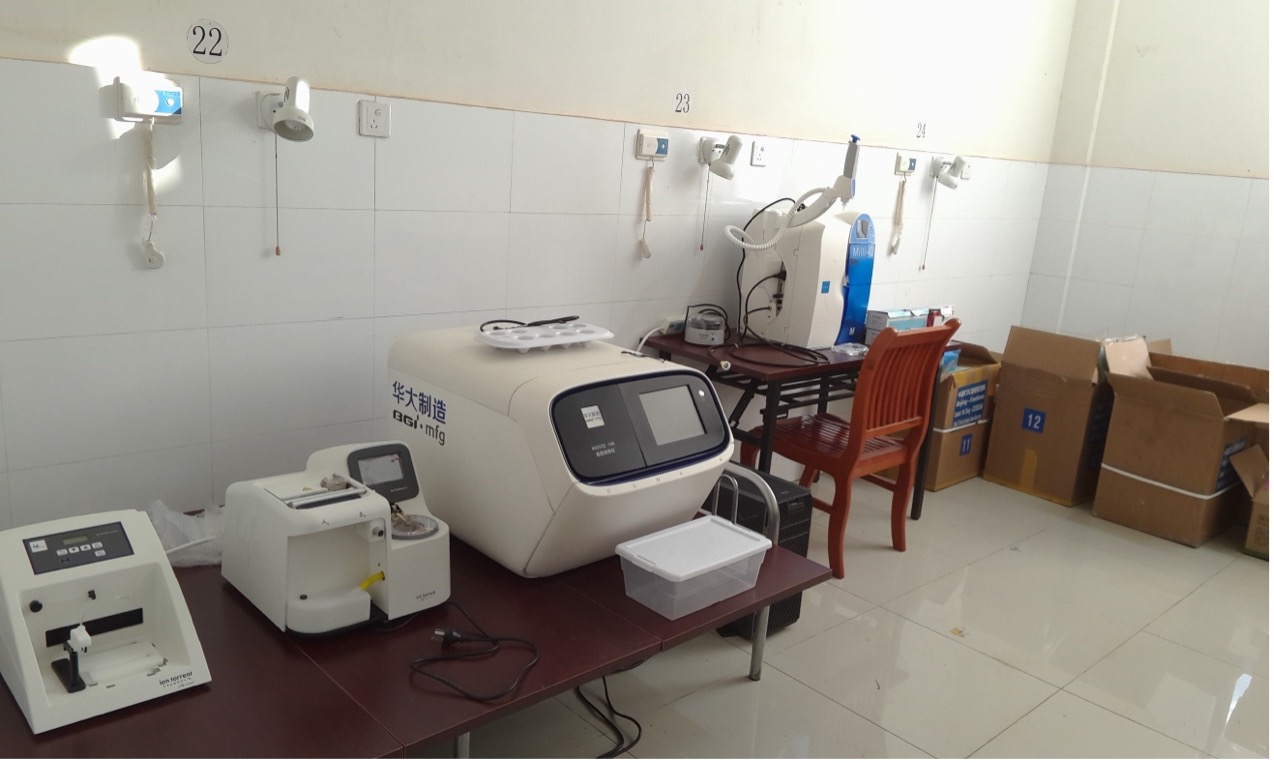 Laboratory environment.
Laboratory environment.
The work environment was challenging. “The tables there were scarce, so we used old hospital beds as makeshift platforms to host our equipment. Electricity was in short supply locally, and power outages were frequent. We had to adapt to the environment as much as possible to get the experiments up and running,” Chen reports. But the mission was clear: “Our main task at the time was to provide sequencing training and support for staff from the China CDC (Chinese Center for Disease Control and Prevention), to detect the Ebola outbreak and monitor the rate of virus mutations.”
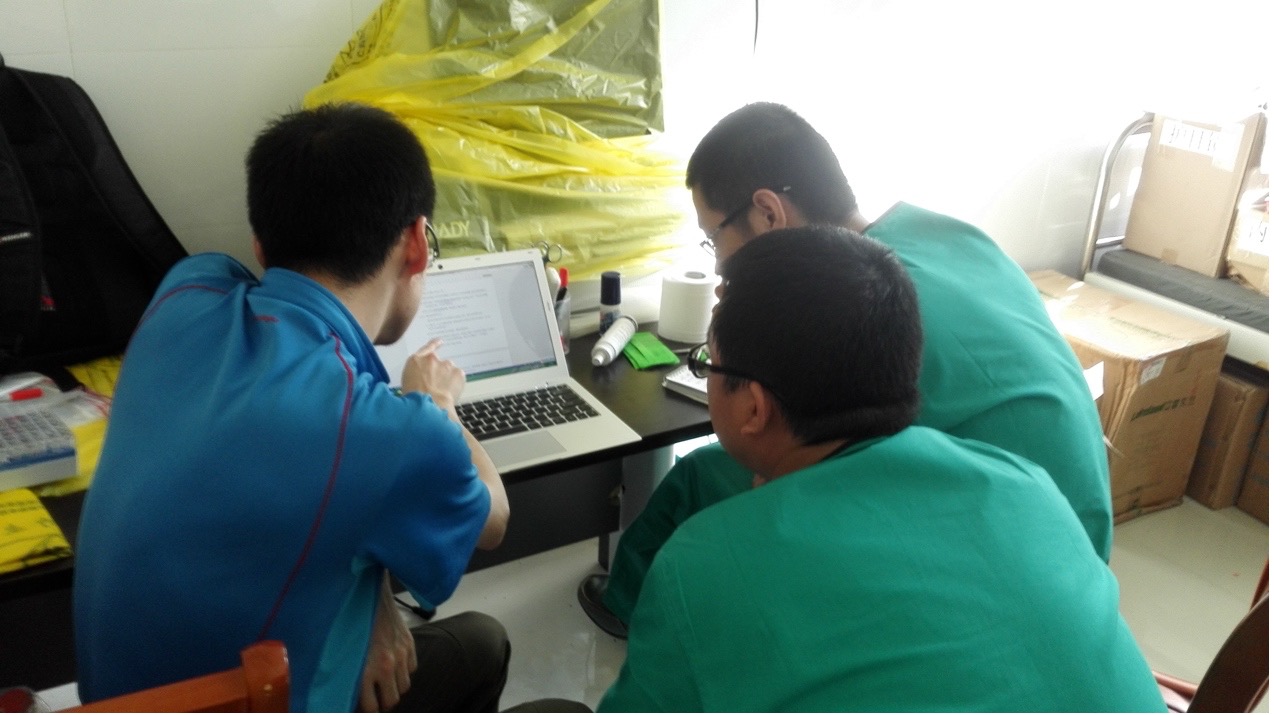 Training session.
Training session.
At the time, some scientists suggested that the Ebola virus was mutating more rapidly than usual, raising fears about increased transmission and lethality. Chen and his teammates assisted the China CDC testing team in completing the testing of 175 samples. “The results showed that the mutation rate of the virus was not as fast as predicted. It was still at a normal level. So, this disproved the claims made by some scientists,” he explains. Their findings brought reassurance to both local and international public health officials.
The human connections forged during this mission left a lasting impression. “People would ask us who we were. When we said we were the Chinese testing team, they would give us a thumbs-up or say ‘Great!’ showing their recognition of the Chinese team,” Chen recalls. “At the airport, whenever China was mentioned, people would say ‘friend,’ showing their friendliness towards the Chinese.”
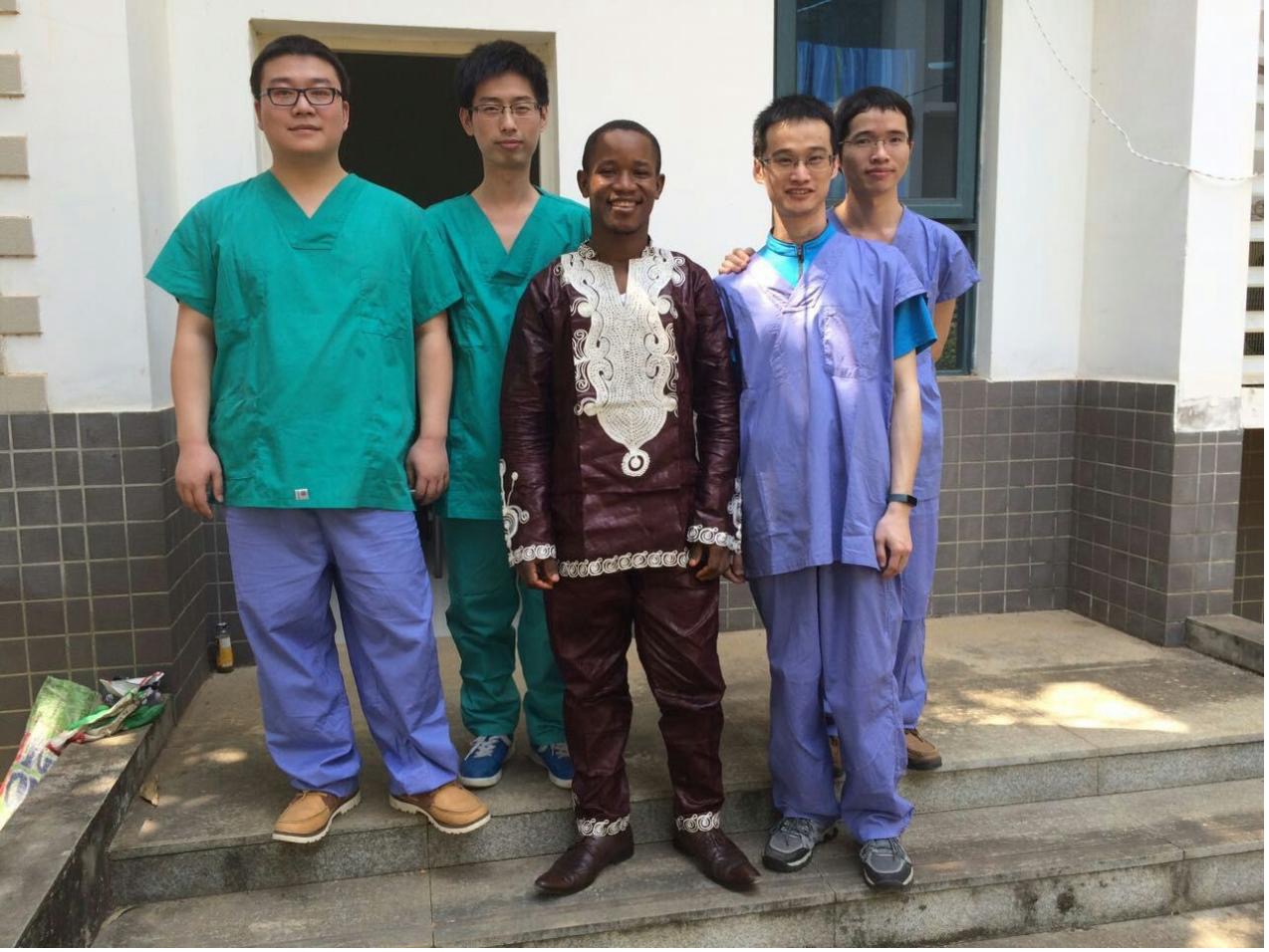 Chen Chengchao (second from right) and other three BGI volunteers, Wang Rui (first from left), Zhu Zhangyong (second from left), Lan Zhiheng (first from right), together with local people in Sierra Leone during the Ebola outbreak in 2015.
Chen Chengchao (second from right) and other three BGI volunteers, Wang Rui (first from left), Zhu Zhangyong (second from left), Lan Zhiheng (first from right), together with local people in Sierra Leone during the Ebola outbreak in 2015.
During the support mission, a new Sierra Leone-China Friendship Biological Safety Laboratory was inaugurated. This important facility not only symbolized the close cooperation between China and Sierra Leone during the crisis but became a lasting foundation for local disease surveillance and response. Today, the laboratory continues to serve the region, strengthening Sierra Leone’s capacity to manage outbreaks and protect public health.
Looking back, Chen reflects, “Now, our equipment is more advanced, our detection faster, and our labs more flexible. But what hasn’t changed is our sense of duty.” Most recently, BGI has continued its commitment to global health by partnering with the China CDC and Sierra Leone institutions on advanced malaria genomic surveillance. In late 2024, the team deployed cutting-edge sequencing platforms and provided comprehensive training to local technicians at the Sierra Leone-China Friendship Biosafety Laboratory. This initiative not only strengthened local capacity for malaria monitoring but also demonstrated BGI’s ongoing role in building sustainable public health systems through technology and collaboration.
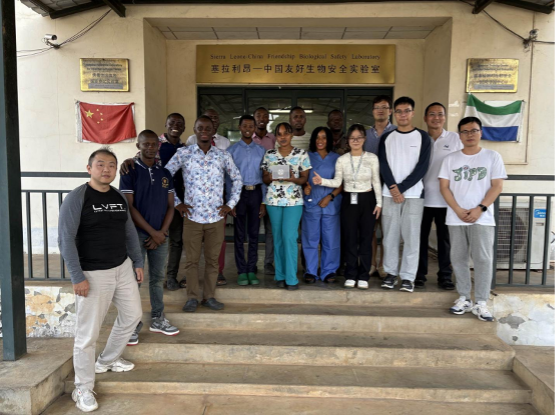 Malaria genomic surveillance team members from the China CDC, BGI and other partners, together with local technicians from Sierra Leone at the Sierra Leone-China Friendship Biosafety Laboratory, 2024.
Malaria genomic surveillance team members from the China CDC, BGI and other partners, together with local technicians from Sierra Leone at the Sierra Leone-China Friendship Biosafety Laboratory, 2024.
“That’s what I will tell my child when he grows up: that sometimes, the greatest contributions come from stepping into the unknown to help others.” On this Africa Day, Chen’s journey with BGI stands as a powerful reminder of the strength found in unity, compassion, and global cooperation - a testament to the spirit that Africa Day celebrates, and to the bonds of partnership that help us overcome the world’s greatest challenges.